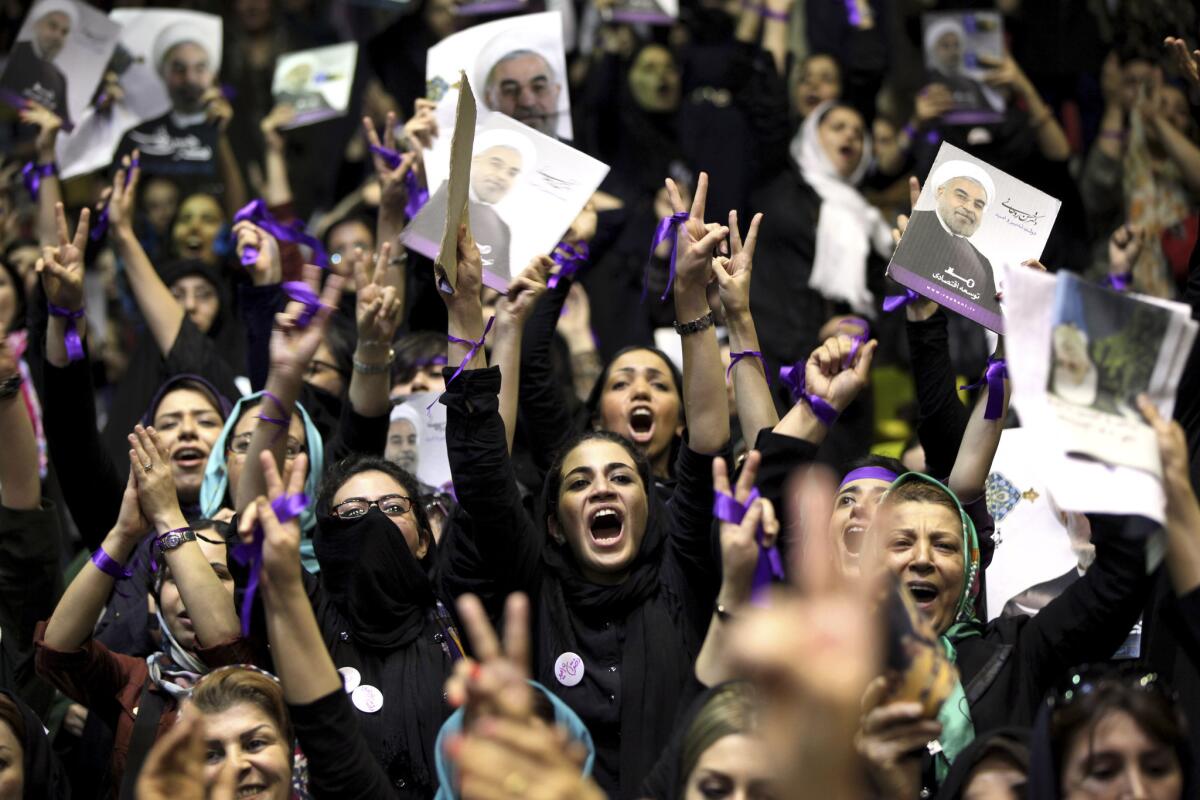Iran’s leading reformist candidate drops out of presidential election

TEHRAN -- Leading reformist candidate Mohammad Reza Aref announced Tuesday that he was dropping out of the race to be Iran’s next president, leaving centrist Hassan Rowhani as the sole moderate-leaning candidate in Friday’s election.
There had been earlier calls for Aref, a former vice president, to step aside to strengthen Rowhani’s chances. Aref said former President Mohammad Khatami, a reformist, had urged him to withdraw.
Rowhani, 65, who previously headed Iran’s nuclear negotiating team, is the only cleric among the eight presidential candidates vetted by the powerful Guardian Council. A soft-spoken man with a graying beard who often wears a white turban, he is considered neither a hard-liner nor a firebrand reformist, but rather a centrist with conservative tendencies.
In recent weeks, Rowhani has sounded a bit like a moderate. His speeches before large crowds have promised social and economic change while urging the country’s younger generation not to lose hope for the future.
“If I become president, our local currency will gain back its true value, and our passports will be respected. Our youth want change, prudence and hope,” Rowhani said at a recent election rally.
Many in the audience of thousands at Tehran’s Shiroudi Stadium on Saturday were young men and women. A DJ fired up the crowd by playing “Yare Dabestani,” or “My fellow student,” which coincidentally -- or not -- was the slogan of the opposition “green movement” that was crushed after the 2009 vote.
In his speech Saturday, Rowhani criticized his hard-line rivals, whose policies on Iran’s nuclear program have left the nation an international outcast saddled with the results of years of economic sanctions.
“I had predicted the dire economic situation and massive unemployment of the youth,” he said. “What have we gained by isolating the wise men of the country? Certain people in this country are proud of themselves for bringing sanctions on us and are proud of themselves for bringing poverty.”
Some young reformists and moderates are wary, however. No vibrant voice for change has emerged in this campaign, and many activists remember what happened in the disputed 2009 election that returned Mahmoud Ahmadinejad to power. Opposition supporters said that election was rigged, triggering mass demonstrations and a bloody government crackdown.
“None of the candidates are favorite ones,” said Salman, a 26-year-old engineer, who like many interviewed didn’t want to give his last name. “I feel hopeless and have no expectations. I feel total apathy. Four years ago, everyone in the streets was trying to convince each other to vote. Nowadays, there is no enthusiasm in the streets.”
But not everyone has lost hope, including 26-year-old Shiva, who came to the rally wearing a loosely tied purple headscarf and a matching purple Rowhani campaign ribbon on her purse.
“We should not give up our hopes,” she whispered near squads of riot police stationed at the rally. “If the majority of people vote for him ... then we will have a reformist president.”
Asked whether she thinks Rowhani would be able to deliver on his promises, Shiva turned quiet for a moment.
“We cannot bet, but let’s hope for the best,” she said.
At Enghelab Square in central Tehran, a young man wearing a colorful T-shirt described how he had been arrested and detained for two weeks following the 2009 protests. Still, he said, he will go to the polls this week.
“I will vote for Rowhani ... simply to show that reformist-minded people are still active and that we want to get out of isolation and back to the international family,” he said, giving his name as Kambiz, before vanishing into the crowds in the square.
ALSO:
Nelson Mandela’s condition remains serious
Police storm Istanbul square, clash with protesters
Snowden’s dilemma: What are the possibilities for asylum?
Special correspondents Mostaghim reported from Tehran and Sandels from Beirut. Times staff writer Jeffrey Fleishman in Cairo contributed to this report.
More to Read
Sign up for Essential California
The most important California stories and recommendations in your inbox every morning.
You may occasionally receive promotional content from the Los Angeles Times.










